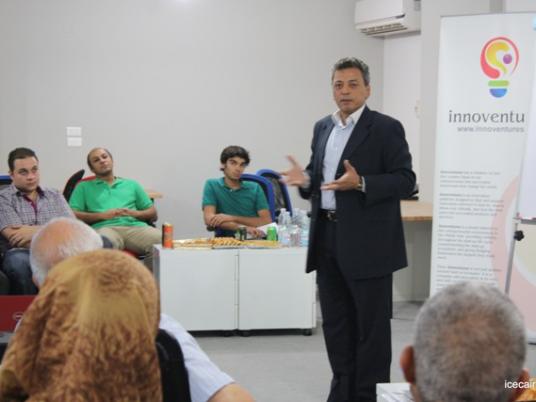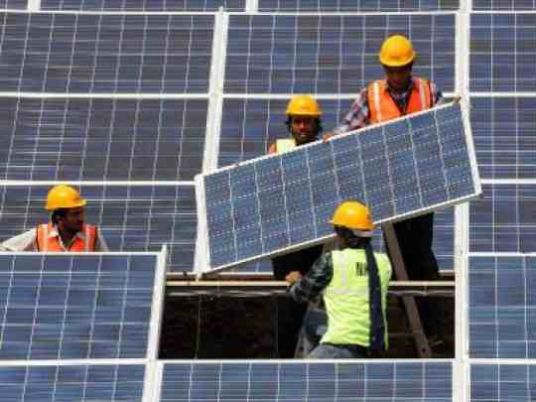
How do you turn a blackout into a business opportunity? As part of its campaign to spread green innovations, icecairo, an Egyptian organization working to develop environmentally friendly technologies, recently hosted a conference on exactly that subject.
Engineer Amr Farouk, an expert in renewable energy and co-founder of Egypt’s Solar Energy Association, gave an insightful lecture about energy overconsumption in the country and the benefits of solar power.
According to Farouk, Egypt’s energy consumption has gradually changed over the years. People now use many more electrical devices, especially in the summer. Every single air conditioner in the country may sometimes be at work for about 11 hours daily during the hot months.
According to some consumption statistics, Cairo is also one of the world’s most brightly lit cities, with a considerable amount of energy used for illuminating homes and streets. This high consumption exceeds what the electricity networks can deliver, so the government is currently faced with a stark choice: either increase energy generation or reduce consumption.
“The ordinary Egyptian household uses an average of five kilowatts of energy per day, which means that it consumes about 1,500 kilowatt hours monthly, says Farouk. According to him, some 18 percent of this energy goes towards heating, along with 20 percent for cooling, and 12 percent for lighting.
Farouk says Egyptians lack awareness on how to ration their power consumption. “They think it’s a complicated process, although there are easy ways to make more than 15 percent energy savings, and good alternatives to traditional power consumption habits,” he explains.
Among these: energy-saving light bulbs, which can conserve 70 percent of energy consumption compared to other light bulbs. Installing 10,000 solar water heaters annually for the next 30 years could also compensate for one of the four nuclear stations the government intends to establish by 2050, he says. And, replacing old air conditioners with new high-efficiency devices is another effective energy-saving device, as their capacity decreases over time, causing them to consume higher amounts of electricity.
Moreover, Farouk says several other countries have managed to increase the use of renewable energy, including Germany and India. He says that Germany began early by providing tax deduction incentives to residents installing solar panels. In India, microloans were provided for those interested in switching to solar. Farouk says the Indian model is probably closer to conditions in Egypt, and he suggests a similar approach to encourage the use of renewable energy here.
Although the repeated blackouts of the past few months angered many, they also opened the door for creative solutions to overcome the problem. Farouk proposes applying a consumption model that turns people from energy consumers to energy producers — and help them make money. He says the trend toward renewable energy no longer focuses only on large entities but instead targets “the bottom of the pyramid,” people in their homes and at their work.
“We can change consumers to producers, by installing renewable energy equipment in households,” Farouk explains. “For example, photovoltaic cells that are used for the generation of electricity can be installed in normal houses to generate electricity either for the same house or for the neighboring houses when connected using a mini-grid.
“Alternatively, photovoltaic cells could be connected to the main grid and pump the energy to the grid — a grid-connected solution — a process that is used in many countries to allow consumers not only to generate their own energy, but also to sell the excess energy to the grid,” he says.
During the blackout days, many shops, restaurants and hotel owners bought expensive diesel generators that also pollute the environment. According to Farouk, the grid project could be applied here, as the photocells are not expensive and are environment-friendly. However, to implement the grid-connected solution, the relevant regulations need to be revisited.
Farouk says the government, NGOs, financial institutions, and businesses must all be involved in making a renewable energy initiative work. Governments identify the framework for the system to work, and banks can provide funds for renewable energy projects. However, people need to know that it’s not only the government’s responsibility but their own too. NGOs must play an important role in increasing awareness about saving energy and the alternative methods that help save it.
The organization that hosted Farouk, icecairo — which stands for Innovation, Collaboration, Entrepreneurship — provides a network run by Egyptians and supported by German organization GIZ. It brings those who are interested in developing green technologies into one physical space.
In collaboration with Innoventures, a collaborative space that also encourages social innovations, icecairo’s team started GreenConnection, which consists of a series of conferences and meet ups for providing green alternatives and solutions for our daily problems.
“Nowadays, we face a lot of challenges in Egypt. That’s why we need to cooperate and take the best of the organizations, the groups and even the individuals who have knowledge and technology because, with cooperation, challenges turn into potential products,” says Jay Cousins, one of the co-founders of icecairo. “In addition to helping communities, we create business opportunities for people through developing those green technologies.
This piece was originally published in Egypt Independent's weekly print edition.




